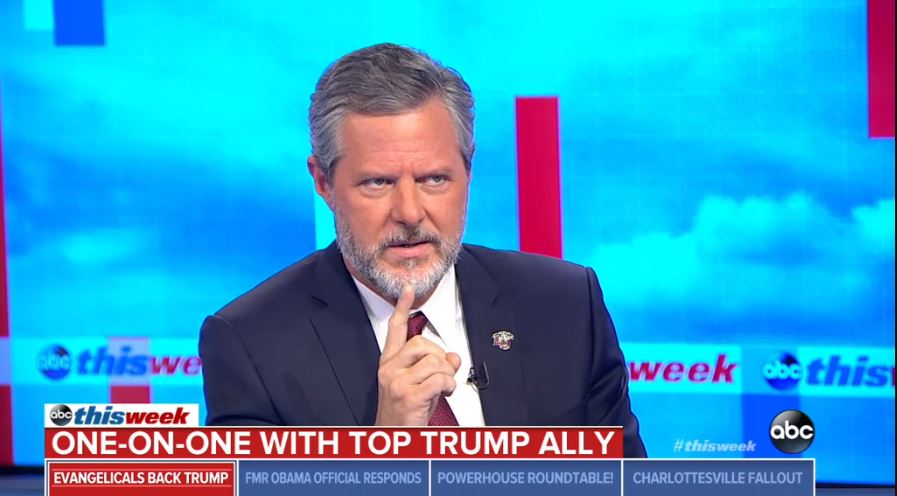Jerry Falwell Jr., has stepped forward in a big way to defend the President repeatedly on hot button issues. Jerry Falwell Jr., who is the president of Liberty University in Virginia, reiterated his open support and admiration for Trump recently on ABC’s “The Week” on August 20 where he spoke about the President’s response to Charlottesville, saying, “Yes, he could be more polished and politically correct, but that’s the reason I supported him, because he’s not.”
Any hint of healthy criticism of Trump’s failure at being “polished and politically correct” was washed by Jerry Falwell Jr.’s unwillingness to denounce white-supremacy without using the word “but” immediately afterwards.
As a young evangelical, here is my concern. There are very few people outside of gospel-seeking churches who know of an evangelicalism detached from political conservatism.
The church must be careful to preserve the authenticity of its witness by selectively choosing when, where, and how to engage political controversy. Our culture today has a keen eye for hypocrisy, and demands now more than ever that Christians embody a loving demeanor if their voice is going to be heard. In the case of Charlottesville, embodying a position of love can mean several things.
First, while leaders like Jerry Falwell Jr. maybe called to be bold to engage the public conversation, we must remember that as Christians we should have a unique capacity for understanding nuanced political opinions. Christians should be prepared to consider all aspects of the human identity, including doctrines of personhood, restorative justice, and care for the oppressed. All of these are in play as part of a compelling and compassionate response to the horrific events in Charlottesville.
Second, while many are begging for evangelical leaders who have traditionally taken a backseat to conversations regarding race and supremacy to step forward, we must do so with clarity and without compromise. Thankfully, many Christian leaders have not been silent in their clear admonishment of white supremacy, while carefully holding politicians accountable when necessary. There is a time and place to draw lines in the sand for Christians who identify with a particular political party. But moments such as this, in times of great tragedy, opting for clarity, specificity, and even self-critique will create soil for future witness to flourish.
Lastly, this age of evangelicalism will be most apt at engaging the culture around us when we are prepared to take what many call political losses for the sake of broad witness and faithfulness to the gospel. When people are killed as a result of domestic terrorism and race-driven violence, a proper response is to mourn, forgive, and teach before looking to place blame on or win points over the opposite political party. Constructing a proper Christian moral framework necessarily includes dying to our own causes, whether they be political, social, or personal, to provide compassionate gospel witness and to encourage the church. This does not mean that every cause Christians care about must be abandoned for the gospel, but rather that when our political identities come into conflict with our ability to minister to a gospel-hungry culture, we choose gospel. Every time.
My fear today is that as Christians of all stripes are drawn further and further into political activism and tribalism that often supersedes Christ-likeness in ways that will cause us to forget that we are called to act distinctly Christian in our witness. Being mindful that we do not seamlessly integrate into classically conservative white politics, all the while thinking we are being Godly, is the humble charge that Christians are to assume in this time and place.
Call it whatever you’d like, but what the American church is struggling most deeply with right now isn’t race, gender, or white supremacy, it’s an identity crisis. This identity crisis is the result of a malfunctioning ethical/moral decision-making hierarchy whereby faith is practiced from the bottom up instead of it being the primary moral motivator.
Christians who abandon talk of faith, morality, Godliness, or dignified personhood regarding hot button social issues of the day are easily spotted as having a tiny God who claims much authority over the “spiritual,” but little sway over the personal and material. The way that Christians construct their worldview hierarchy today affects how people will identify Christianity tomorrow. While some are understandably concerned that many millennial Christians are becoming dangerously “liberal,” biblically orthodox and reformed resurgences among young evangelicals have helped to shape much of the millennial generation’s moral hierarchy so that God rests, as He should, sovereignly at the top.
Tribalism stands out recently as a sure marker of identity disorder within much of conservative Christianity, and voices like Jerry Falwell Jr. are sometimes making it very difficult for believers who want to actively engage the world with truth, kindness, and Christ-like compassion. Let us take up a new model for compassionate witness, look to Christ’s immovable commitment to compassion and grace toward both the aggressor and the oppressed.
No comments yet




